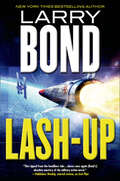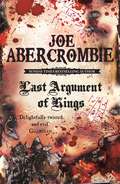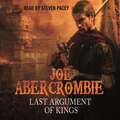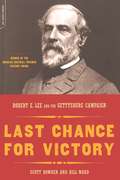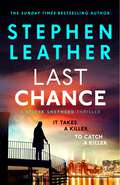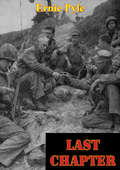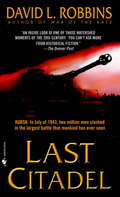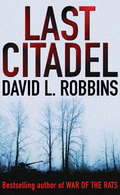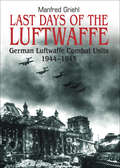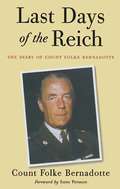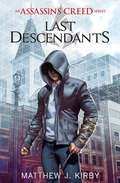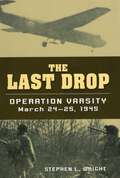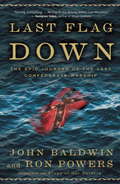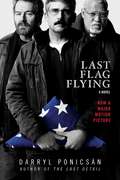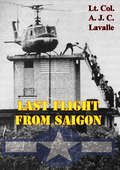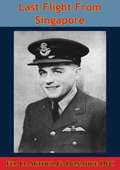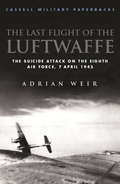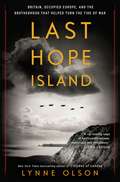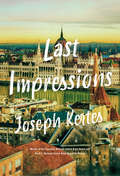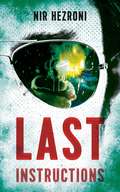- Table View
- List View
Lash-Up
by Larry BondNew York Times bestselling author Larry Bond thrills again in Lash-Up, an explosive new novel. In a bid to dominate Asia and the western Pacific, China provokes a military crisis with the United States and then starts shooting down GPS satellites. America has only a short amount of time to devise some way of protecting its remaining satellites or China will gain an enormous advantage in the coming conflict. The only way the satellites can be protected is from orbit, so an armed spacecraft must be quickly designed, built, and launched to fight on this new battlefield.A team of soldier-scientists must construct a craft capable of knocking space weapons out of the sky. The fate of the United States rests on the shoulders of these determined people.At the Publisher's request, this title is being sold without Digital Rights Management Software (DRM) applied.
Last Argument Of Kings: Book Three (The First Law #Bk. 3)
by Joe AbercrombieThe end is coming.Logen Ninefingers might only have one more fight in him - but it's going to be a big one. Battle rages across the North, the King of the Northmen still stands firm, and there's only one man who can stop him. His oldest friend, and his oldest enemy. It's past time for the Bloody-Nine to come home.With too many masters and too little time, Superior Glokta is fighting a different kind of war. A secret struggle in which no-one is safe, and no-one can be trusted. His days with a sword are far behind him. It's a good thing blackmail, threats and torture still work well enough.Jezal dan Luthar has decided that winning glory is far too painful, and turned his back on soldiering for a simple life with the woman he loves. But love can be painful too, and glory has a nasty habit of creeping up on a man when he least expects it.While the King of the Union lies on his deathbead, the peasants revolt and the nobles scramble to steal his crown. No-one believes that the shadow of war is falling across the very heart of the Union. The First of the Magi has a plan to save the world, as he always does. But there are risks. There is no risk more terrible, after all, than to break the First Law...
Last Argument Of Kings: Book Three (The First Law #Bk. 3)
by Joe AbercrombieThe end is coming.Logen Ninefingers might only have one more fight in him - but it's going to be a big one. Battle rages across the North, the King of the Northmen still stands firm, and there's only one man who can stop him. His oldest friend, and his oldest enemy. It's past time for the Bloody-Nine to come home.With too many masters and too little time, Superior Glokta is fighting a different kind of war. A secret struggle in which no-one is safe, and no-one can be trusted. His days with a sword are far behind him. It's a good thing blackmail, threats and torture still work well enough.Jezal dan Luthar has decided that winning glory is far too painful, and turned his back on soldiering for a simple life with the woman he loves. But love can be painful too, and glory has a nasty habit of creeping up on a man when he least expects it.While the King of the Union lies on his deathbead, the peasants revolt and the nobles scramble to steal his crown. No-one believes that the shadow of war is falling across the very heart of the Union. The First of the Magi has a plan to save the world, as he always does. But there are risks. There is no risk more terrible, after all, than to break the First Law...
Last Argument Of Kings: Book Three (The First Law)
by Joe AbercrombieThe end is coming.Logen Ninefingers might only have one more fight in him - but it's going to be a big one. Battle rages across the North, the King of the Northmen still stands firm, and there's only one man who can stop him. His oldest friend, and his oldest enemy. It's past time for the Bloody-Nine to come home.With too many masters and too little time, Superior Glokta is fighting a different kind of war. A secret struggle in which no-one is safe, and no-one can be trusted. His days with a sword are far behind him. It's a good thing blackmail, threats and torture still work well enough.Jezal dan Luthar has decided that winning glory is far too painful, and turned his back on soldiering for a simple life with the woman he loves. But love can be painful too, and glory has a nasty habit of creeping up on a man when he least expects it.While the King of the Union lies on his deathbead, the peasants revolt and the nobles scramble to steal his crown. No-one believes that the shadow of war is falling across the very heart of the Union. The First of the Magi has a plan to save the world, as he always does. But there are risks. There is no risk more terrible, after all, than to break the First Law...
Last Chance for Victory: Robert E. Lee and the Gettysburg Campaign
by Bill Ward Scott BowdenAn award-winning, groundbreaking, and controversial reappraisal of the most written-about battle in American history.
Last Chance: The stunning new thriller from the legendary SUNDAY TIMES bestselling author (The Spider Shepherd Thrillers #22)
by Stephen LeatherA GLOBAL CABAL OF HITMEN. ONE MAN STOOD IN THEIR PATH.'Two things to make a Summer afternoon great: a Stephen Leather novel, and a cold beer' ⭐⭐⭐⭐⭐'Spider keeps getting better and better' ⭐⭐⭐⭐⭐'The best series I have ever read' ⭐⭐⭐⭐⭐A group of professional killers, known as The Office, are carrying out hits for the Iranian government across the European continent, hitting targets amongst the wealthiest and most privileged.After a slew of murders in London, MI5 decide that enough is enough. The Office must be destroyed, root and stem.Dan 'Spider' Shepherd, the secret service's most dangerous weapon, is tasked with infiltrating the organisation and unmasking its leader. But just how far is he willing to go in the name of justice . . . ?A hundred-mile-an-hour whirlwind of a novel from one of the world's most gifted thriller authors.PRAISE FOR STEPHEN LEATHER'Let Spider draw you into his web, you won't regret it' Sun'He has the uncanny knack of producing plots that are all too real' Daily Mail'Leather knows the inner workings of the security services. But beyond the enthralling storylines he also asks some tough questions about contemporary Britain' Financial Times'A master of the thriller genre' Irish Times'Stephen Leather writes really exciting action thrillers. It's like being there yourself' Chris Ryan
Last Chance: The stunning new thriller from the legendary SUNDAY TIMES bestselling author (The Spider Shepherd Thrillers #22)
by Stephen LeatherA GLOBAL CABAL OF HITMEN. ONE MAN STOOD IN THEIR PATH.'Two things to make a Summer afternoon great: a Stephen Leather novel, and a cold beer' ⭐⭐⭐⭐⭐'Spider keeps getting better and better' ⭐⭐⭐⭐⭐'The best series I have ever read' ⭐⭐⭐⭐⭐A group of professional killers, known as The Office, are carrying out hits for the Iranian government across the European continent, hitting targets amongst the wealthiest and most privileged.After a slew of murders in London, MI5 decide that enough is enough. The Office must be destroyed, root and stem.Dan 'Spider' Shepherd, the secret service's most dangerous weapon, is tasked with infiltrating the organisation and unmasking its leader. But just how far is he willing to go in the name of justice . . . ?A hundred-mile-an-hour whirlwind of a novel from one of the world's most gifted thriller authors.PRAISE FOR STEPHEN LEATHER'Let Spider draw you into his web, you won't regret it' Sun'He has the uncanny knack of producing plots that are all too real' Daily Mail'Leather knows the inner workings of the security services. But beyond the enthralling storylines he also asks some tough questions about contemporary Britain' Financial Times'A master of the thriller genre' Irish Times'Stephen Leather writes really exciting action thrillers. It's like being there yourself' Chris Ryan
Last Chance: The stunning new thriller from the legendary SUNDAY TIMES bestselling author (The Spider Shepherd Thrillers #22)
by Stephen LeatherA GLOBAL CABAL OF HITMEN. ONE MAN STOOD IN THEIR PATH.'Two things to make a Summer afternoon great: a Stephen Leather novel, and a cold beer' ⭐⭐⭐⭐⭐'Spider keeps getting better and better' ⭐⭐⭐⭐⭐'The best series I have ever read' ⭐⭐⭐⭐⭐A group of professional killers, known as The Office, are carrying out hits for the Iranian government across the European continent, hitting targets amongst the wealthiest and most privileged.After a slew of murders in London, MI5 decide that enough is enough. The Office must be destroyed, root and stem.Dan 'Spider' Shepherd, the secret service's most dangerous weapon, is tasked with infiltrating the organisation and unmasking its leader. But just how far is he willing to go in the name of justice . . . ?A hundred-mile-an-hour whirlwind of a novel from one of the world's most gifted thriller authors.PRAISE FOR STEPHEN LEATHER'Let Spider draw you into his web, you won't regret it' Sun'He has the uncanny knack of producing plots that are all too real' Daily Mail'Leather knows the inner workings of the security services. But beyond the enthralling storylines he also asks some tough questions about contemporary Britain' Financial Times'A master of the thriller genre' Irish Times'Stephen Leather writes really exciting action thrillers. It's like being there yourself' Chris Ryan
Last Chapter
by Ernie Pyle"No man in this war has so well told the story of the American fighting man as American fighting men wanted it told," wrote Harry Truman. "He deserves the gratitude of all his countrymen."THIS is the final book of Ernie Pyle's war reporting. After Africa, Italy, and D-Day on the European continent, Pyle took it the hard way again. There was still the Pacific war to win, and where the fighting was Ernie had to go, soul-sick though he was with the thousands of scenes of death and destruction he had already witnessed.He was attached to the Navy early in 1945. In the Marianas first and then living with the boys who flew the B-29s over the Japanese homeland, Pyle was experiencing a side of the war that was new to him. Next he joined an aircraft carrier on the invasion of Okinawa. He made the landing with the Marines and saw Okinawa secured.Then his luck ran out. A Japanese bullet killed Ernie Pyle on April 17th, 1945 on Ie Shima, and Americans lost their greatest and best-loved correspondent. Millions mourned the going of this modest man who wrote of the war with all honesty and no pretensions, and whose writings will stand as one of the most vital records of the struggle. LAST CHAPTER is a brief, brave little book to complete that record permanently. There is a sixteen-page picture section and an index of names and places.
Last Citadel
by David L. RobbinsAfter the cataclysmic fall of Stalingrad, Germany's campaign in Russia stood on a knife's edge. Hitler had to break Russia quickly or the war would be over. Thus 'Operation Citadel' was conceived. This was a plan to eliminate the huge salient around the Russian city of Kursk and trap the enormous Soviet Army in a noose of German steel. The only trouble was that the Russians knew it was coming. . . This is the story of that battle through the eyes of a remarkable group of people - the men and women who fought it. All in all, two million soldiers, 6000 tanks and 4000 aircraft fought in the seven day offensive and after their defeat, the Germans never took another step forward into the motherland.
Last Citadel
by David L. RobbinsThe riveting new military novel from the bestselling author of WAR OF THE RATSAfter the cataclysmic fall of Stalingrad, Germany's campaign in Russia stood on a knife's edge. Hitler had to break Russia quickly or the war would be over. Thus 'Operation Citadel' was conceived. This was a plan to eliminate the huge salient around the Russian city of Kursk and trap the enormous Soviet Army in a noose of German steel. The only trouble was that the Russians knew it was coming... A powerful look into the maelstrom of the greatest battle in history, LAST CITADEL follows the story through the eyes of a remarkable group of people - the men and women who fought for family, pride, country and, finally, for survival . . .
Last Days of the Luftwaffe: German Luftwaffe Combat Units, 1944–1945
by Manfred GriehlDrawn from newly-available historical archives, this German air force history is “packed with many fascinating revelations.” (IPMS/USA)The end of the Second World War in Europe was an epoch of complete social, cultural and technological upheaval. In the realm of military and aviation history this period was revolutionary. The eclipse of the piston-engine, and the introduction of electronic detection equipment, rockets and airborne weapons in previously unknown quantities changed the face of the air war and paved the way for post-war developments in aviation technology.Many details of this crucial phase of the war remained hidden for many years in top-secret files, but in this fascinating new history Manfred Griehl makes use of recently declassified sources, alongside his own vast collection of photographs, to provide a fresh look at the story of the Luftwaffe. Among the many aspects he covers are the new models of Bf 109 and Fw 190; the Me 262 jet plane; the establishment of He 162 squadrons; Stukas and Fw 190 fighter-bomber operations on the Eastern Front; Me 262 Blitzbombers in the West, the recruitment of 1928-born Hitler Youth into the two hundred glider schools; the increasing importance of remote-controlled air-to-air rockets; and the development of heavy bombs, remote-controlled bombs, atom bombs and Germany’s chemical and bacteriological arsenal. Brimming with intriguing discoveries, such as the existence of the real-life Luftwaffe kamikaze squadron, this meticulously researched and fully illustrated book will be of interest to historians and enthusiasts alike.
Last Days of the Reich: The Diary of Count Folke Bernadotte
by Folke BernadotteCount Folke Bernadotte was one of those rare figures in war ' a man trusted by both sides alike. Shortly before the war ended, Bernadotte was the leader of a rescue operation to transfer western European inmates to Swedish hospitals in the so-called 'White Buses'. This work through the Swedish Red Cross involved mercy missions to Germany and it was through this link that Bernadotte came into touch with prominent Nazi leaders in the 1940s. During the last months of the war, Bernadotte was introduced to Heinrich Himmler ' one of the most sinister men of the Third Reich. Bernadotte was asked by Himmler to approach the Allies with the proposal of a complete surrender to Britain and the US ' providing Germany could continue to fight the Soviet Union. The offer was passed to Winston Churchill and Harry Truman, but rejected. The course of these negotiations is narrated in this book with a simple, compelling clarity and thrilling immediacy. This new edition of Bernadotte's memoir includes a Preface by his two sons, and an Introduction by a leading Swedish author discussing Count Bernadotte's wartime record and his post-war assassination.
Last Descendants: An Assassin's Creed Novel Series (Last Descendants: An Assassin's Creed Series #1)
by Matthew J. KirbyAn all-new series based on the hit Ubisoft(R) video game franchise "Assassin's Creed." Part historical fiction, part tie-in, this novel creates an all-new narrative fans of the video games will love.Nothing in Owen's life has been right since his father died in prison, accused of a crime Owen is certain he didn't commit. Monroe, the IT guy at school, might finally bring Owen the means to clear his father's name by letting him use an Animus-a device that lets users explore genetic memories buried within their own DNA. During a simulation, Owen comes uncovers the existence of a powerful relic long considered a legend-the Trident of Eden. Now two secret organizations will stop at nothing to take possession of this artifact-the Brotherhood of Assassins and the Templar Order. It becomes clear the only way to save himself is to find the Trident first.Under the guidance of Monroe, Owen and a group of other teenagers go into a memory they all share within their DNA: the 1863 Draft Riots in New York City. Owen and his companions will find themselves tested on the violent streets of New York, and their experiences in the past will have far-reaching consequences in the present.
Last Drop: Operation Varsity, March 24-25, 1945
by Stephen L. WrightFirst full-length history of the largest and most successful airborne offensive ever. Scores of eyewitness accounts from paratroopers, glidermen, pilots, and infantrymen plus details on planes, gliders, and equipment. Recounts the actions for which participants won two Medals of Honor, a Victoria Cross, and a Conspicuous Gallantry Medal.
Last Flag Down
by Ron Powers John BaldwinAs the Confederacy felt itself slipping beneath the Union juggernaut in late 1864, the South launched a desperate counteroffensive to shatter the U. S. economy and force a standoff. Its secret weapon? A state-of-the-art raiding ship whose mission was to prowl the world’s oceans and sink the U. S. merchant fleet. The raider’s name was Shenandoah, and her executive officer was Conway Whittle, a twenty-four-year-old warrior who might have stepped from the pages of Arthurian legend. Whittle would share command with a dark and brooding veteran of the seas, Capt. James Waddell, and together with a crew of strays, misfits, and strangers, they would spend nearly a year sailing two-thirds of the way around the globe, destroying dozens of Union ships and taking more than a thousand prisoners, all while continually dodging the enemy. Then, in August of 1865, a British ship revealed the shocking truth to the men of Shenandoah: The war had been over for months, and they were now being hunted as pirates. What ensued was an incredible 15,000-mile journey to the one place the crew hoped to find sanctuary, only to discover that their fate would depend on how they answered a single question. Wondrously evocative and filled with drama and poignancy,Last Flag Downis a riveting story of courage, nobility, and rare comradeship forged in the quest to achieve the impossible.
Last Flag Flying: A Novel
by Darryl PonicsánNow a major movie starring Steve Carell, Bryan Cranston, and Laurence Fishburne, directed by Richard Linklater!Darryl Ponicsan's debut novel The Last Detail was named one of the best of the year and widely acclaimed, catapulting him to fame when it was first published. The story of two career sailors assigned to escort a young seaman from Norfolk to the naval prison in Portsmouth, New Hampshire—and of the mayhem that ensues—was made into an award-winning movie starring Jack Nicholson. Last Flag Flying, set thirty-four years after the events of The Last Detail, brings together the same beloved characters—Billy Bad-Ass Buddusky, Mule Mulhall, and Meadows—to reprise the same journey but under very different circumstances. Now middle-aged, Meadows seeks out his former captors in their civilian lives to help him bury his son, a Marine killed in Iraq, in Arlington National Cemetery. When he learns that the authorities have told him a lie about the circumstances of his son's death, he decides, with the help of the two others, to transport him home to Portsmouth. And so begins the journey, centered around a solemn mission but, as in the first book, a protest against injustice and celebration of life too, at once irreverent, funny, profane, and deeply moving.Last Flag Flying is now a major movie from Amazon Studios, directed by Richard Linklater and starring Bryan Cranston, Steve Carell, and Laurence Fishburne.
Last Flight From Saigon [Illustrated Edition] (USAF Southeast Asia Monograph Series #4)
by Lt.-Col. A. J. C. LavalleIllustrated with over 30 maps, diagrams and photosThe Southeast Asia Monograph Series is designed and dedicated to telling the story of USAF's participation in the Vietnam War. This monograph, the sixth in the Series, adds another exciting chapter to our continuing effort to bring forth and highlight the dedication, courage, and professionalism of the U.S. airman in combat. The primary intent of this series is to emphasize and dramatize the human aspects of this long and frustrating struggle, straying somewhat away from the cold hard statistics of "tons of bombs dropped" and "structures destroyed," etc., frequently the headliners in historical presentations."Last Flight From Saigon" is an exciting and moving account of how all our Services, as well as several civilian agencies, pulled together to pull-off the largest aerial evacuation in history-what many have referred to as a modern day Dunkirk. The three authors, intimately involved with the evacuation from beginning to end, have carefully pieced together an amazing story of courage, determination and American ingenuity. Above all, it's a story about saving lives; one that is seldom told in times of war. All too often, critics of armed conflict make their targets out to be something less than human, bent on death and destruction. One need only study the enormity of the effort and cost that went into the "evacuation of Saigon," and the resultant thousands of lives that were saved, to realize that the American fighting man is just as capable, and more eager, to save lives than he is in having to wage war.
Last Flight From Singapore [Illustrated Edition]
by Flt. Lt. Arthur G. Donahue DFCIncludes 20 illustrations.Arthur "Art" Gerald Donahue, a native of Minnesota, bravely entered the fray of the Second World War as volunteer pilot in the Royal Air Force by falsely claiming to be a Canadian in 1940. He was already an experienced pilot before he took off in his Spitfire in 64 Squadron based at RAF Kenley, and then 71 Squadron. His experiences and victories during the Battle of Britain are recounted in his first book "Yankee In A Spitfire" but suffice it to say he flew with great skill and courage as one of the "Few". After a period of brief leave in America he was transferred to the Far East with 258 Squadron, a part of the belated effort to reinforce Singapore. In this book he recounts his adventures in the air over Singapore and Sumatra in the chaotic fighting that saw the British troops routed by a brilliant offensive by the Japanese. Surviving the overwhelming odds in the air, the author managed to escape back to England via India; but was listed as missing in action in 1942."Donahue makes no attempt either to dramatize or underplay his experiences. He tells them in a simple, unvarnished manner, much as if he were sitting down with some friends back home. The result is pretty close to what the real thing must have been."--New York Times
Last Flight of the Luftwaffe
by Adrian WeirThe account of one of the most extraordinary stories to come from the closing days of the Second World War.Desperate times drive determined men to desperate measures. In April 1945, their cause already clearly lost, an ill-assorted, ill-equipped group of Luftwaffe crew decided on one final 'death or glory' kamikaze mission - their trage an incoming USAAF Eighth Air Force bomber formation, their only weapons their aircraft.Adrian Weir has researched this remarkable flight to retell it minute by minute: a hopeless gesture of immense courage, thrilling as the reader flies in the cockpit with the German pilots towards the unstoppable aircarft of the Mighty Eighth. Including accounts from the survivors of the mission, this is one of the most extraordinary stories to come from the closing days of the Second World War.
Last Flight of the Luftwaffe: The Suicide Attack On The Eigth Air Force, 7 April 1945 (Sven Hassel War Classics)
by Adrian WeirThe account of one of the most extraordinary stories to come from the closing days of the Second World War.Desperate times drive determined men to desperate measures. In April 1945, their cause already clearly lost, an ill-assorted, ill-equipped group of Luftwaffe crew decided on one final 'death or glory' kamikaze mission - their trage an incoming USAAF Eighth Air Force bomber formation, their only weapons their aircraft.Adrian Weir has researched this remarkable flight to retell it minute by minute: a hopeless gesture of immense courage, thrilling as the reader flies in the cockpit with the German pilots towards the unstoppable aircarft of the Mighty Eighth. Including accounts from the survivors of the mission, this is one of the most extraordinary stories to come from the closing days of the Second World War.
Last Groom Standing (The Wedding Season #4)
by Kimberly LangMarnie Price's guide to surviving the bridesmaid blues...1. Get a new man2. Find a new job 3. When in doubt, drink wine! Having watched her three closest friends all find love, Southern belle Marnie Price feels as if she's the only single girl left. Luckily she's found a solution-one sizzling night with Dylan Brookes. This man wears a wedding tux better than anyone, but all Marnie wants to do is get beneath it! Dylan is all about making the sensible choice, and a fling with his ex's friend Marnie is about as far from sensible as he can get! Marnie might prove to him that taking risks is worth it, but that doesn't mean he's ready to give up his bachelor status quite yet, does it...?Look for all four books in the Wedding Season series from Harlequin KISS: The Unexpected Wedding Guest by Aimee Carson, Girl Least Likely to Marry by Amy Andrews, Maid of Dishonor by Heidi Rice and Last Groom Standing by Kimberly Lang.
Last Hope Island: Britain, Occupied Europe, and the Brotherhood That Helped Turn the Tide of War
by Lynne OlsonA groundbreaking account of how Britain became the base of operations for the exiled leaders of Europe in their desperate struggle to reclaim their continent from Hitler, from the New York Times bestselling author of Citizens of London and Those Angry Days When the Nazi blitzkrieg rolled over continental Europe in the early days of World War II, the city of London became a refuge for the governments and armed forces of six occupied nations who escaped there to continue the fight. So, too, did General Charles de Gaulle, the self-appointed representative of free France. As the only European democracy still holding out against Hitler, Britain became known to occupied countries as “Last Hope Island.” Getting there, one young emigré declared, was “like getting to heaven.” In this epic, character-driven narrative, acclaimed historian Lynne Olson takes us back to those perilous days when the British and their European guests joined forces to combat the mightiest military force in history. Here we meet the courageous King Haakon of Norway, whose distinctive “H7” monogram became a symbol of his country’s resistance to Nazi rule, and his fiery Dutch counterpart, Queen Wilhelmina, whose antifascist radio broadcasts rallied the spirits of her defeated people. Here, too, is the Earl of Suffolk, a swashbuckling British aristocrat whose rescue of two nuclear physicists from France helped make the Manhattan Project possible. Last Hope Island also recounts some of the Europeans’ heretofore unsung exploits that helped tilt the balance against the Axis: the crucial efforts of Polish pilots during the Battle of Britain; the vital role played by French and Polish code breakers in cracking the Germans’ reputedly indecipherable Enigma code; and the flood of top-secret intelligence about German operations—gathered by spies throughout occupied Europe—that helped ensure the success of the 1944 Allied invasion. A fascinating companion to Citizens of London, Olson’s bestselling chronicle of the Anglo-American alliance, Last Hope Island recalls with vivid humanity that brief moment in time when the peoples of Europe stood together in their effort to roll back the tide of conquest and restore order to a broken continent.Advance praise for Last Hope Island“A rip-roaring saga of hairbreadth escape, espionage, and resistance during World War II, Lynne Olson’s Last Hope Island salvages the forgotten stories of a collection of heroic souls from seven countries overrun by Hitler who find refuge in Churchill’s London and then seek payback in ways large and small. In thrilling fashion, Olson shows us that hell hath no fury like a small country scorned.”—Erik Larson, New York Times bestselling author of Dead Wake “Lynne Olson is a master storyteller, and she brings her great gifts to this riveting narrative of the resistance to Hitler’s war machine. You will be thrilled and moved—and enraged, saddened, and shocked—by the courage and steadfastness, human waste and stupidity, carelessness and nobility, of an epic struggle. Last Hope Island is a smashing good tale.”—Evan Thomas, New York Times bestselling author of Being Nixon “A powerful and surprising account of how figures from Nazi-occupied Europe found Great Britain an essential shield and sword in the struggle against Hitler. This is a wonderful work of history, told in Olson’s trademark style.”—Jon Meacham, Pulitzer Prize–winning author of American Lion
Last Impressions
by Joseph KertesHow can you say goodbye forever when you've left an important secret unspoken?"I'll tell you what I'm going to do," Zoltan said. "When I die, I'll leave my luck to you."Zoltan Beck is dying. His devoted but long-suffering sons, Ben and Frank, are trying to prepare themselves and their families for Zoltan's eventual departure...but they can't quite bring themselves to believe that the end is really at hand, and neither can Zoltan himself. The head of a family marked by war and tragedy for decades, he "can't stand to be in a room with a miserable person" and has done his best to keep the pain of his refugee past from his beloved children. But as he faces the end of his life, he discovers a heartbreaking secret from the War that will ultimately bring the family together--or irrevocably disrupt it. Set in both mid-20th century Hungary and contemporary Toronto, this is a deeply moving novel that revels in the energy of its extraordinary characters. It is the story of lost love and newfound connections, of a father and his sons desperately reaching out to bridge an ever-widening gap...even as their time together ebbs away.
Last Instructions (Agent 10483 Ser. #2)
by Nir HezroniFirst there was Three Envelopes, critically acclaimed on publication – now the story of Israeli secret service operative Agent 10483 continues in Last Instructions. A psychopathic former Israeli spy, Agent 10483 is busy trying to shut down the spy organization he once worked for. At the same time, he is plotting his revenge on the individuals he deemed responsible for betraying him, and trying to hunt down a nuclear warhead. It cannot end well. Everyone wants to get their hands on him: the Organization, two assassins working for Herr Schmidt, who is also trying to get hold of the warhead, and Carmit, who has quite literally been messing with his brain. Offering a fascinating behind-the-scenes glimpse into the technology of high-level intelligence operations, Nir Hezroni&’s dark thriller is a chilling exploration of a psychotic killer.
